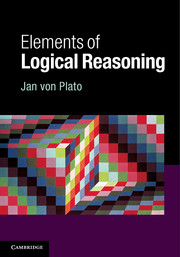Book contents
- Frontmatter
- Contents
- Preface
- PART I First steps in logical reasoning
- 1 Starting points
- 2 Rules of proof
- 3 Natural deduction
- 4 Proof search
- 5 Classical natural deduction
- 6 Proof search in classical logic
- 7 The semantics of propositional logic
- Part II Logical reasoning with the quantifiers
- Part III Beyond pure logic
- Part IV Complementary topics
- Suggestions for the use of this book
- Further reading
- Bibliography
- Index of names
- Index of subjects
1 - Starting points
Published online by Cambridge University Press: 05 June 2014
- Frontmatter
- Contents
- Preface
- PART I First steps in logical reasoning
- 1 Starting points
- 2 Rules of proof
- 3 Natural deduction
- 4 Proof search
- 5 Classical natural deduction
- 6 Proof search in classical logic
- 7 The semantics of propositional logic
- Part II Logical reasoning with the quantifiers
- Part III Beyond pure logic
- Part IV Complementary topics
- Suggestions for the use of this book
- Further reading
- Bibliography
- Index of names
- Index of subjects
Summary
Some of our earliest experiences of the conclusive force of an argument come from school mathematics: Faced with a mathematical proof, however we try to twist the matter, there is no possibility of denying the conclusion once the premisses have been accepted.
Behind the examples from mathematics, there is a more general pattern of'demonstrative arguments' that is studied in the science of logic. Logical reasoning is applied at all levels, from everyday life to the most advanced sciences. As an example of the former, assume that under some specific conditions, call them A,something, call it B, necessarily follows. Assume further that the conditions A are fulfilled. To deny B under these circumstances would lead to a contradiction, so that either B has to be accepted or at least one of the assumptions revised – or at least that is what the fittest thinker would do to survive.
A remarkable level of complexity is achieved in everyday logical reasoning, even if the principles behind it remain intuitive. We begin our analysis of logical reasoning by the observation that the forms of such reasoning are connected to the forms of linguistic expression used and that these forms have to be made specific and precise in each situation. When this is done, it turns out that a rather limited set of first principles is sufficient for the representation of any logical argument.
- Type
- Chapter
- Information
- Elements of Logical Reasoning , pp. 3 - 14Publisher: Cambridge University PressPrint publication year: 2014



